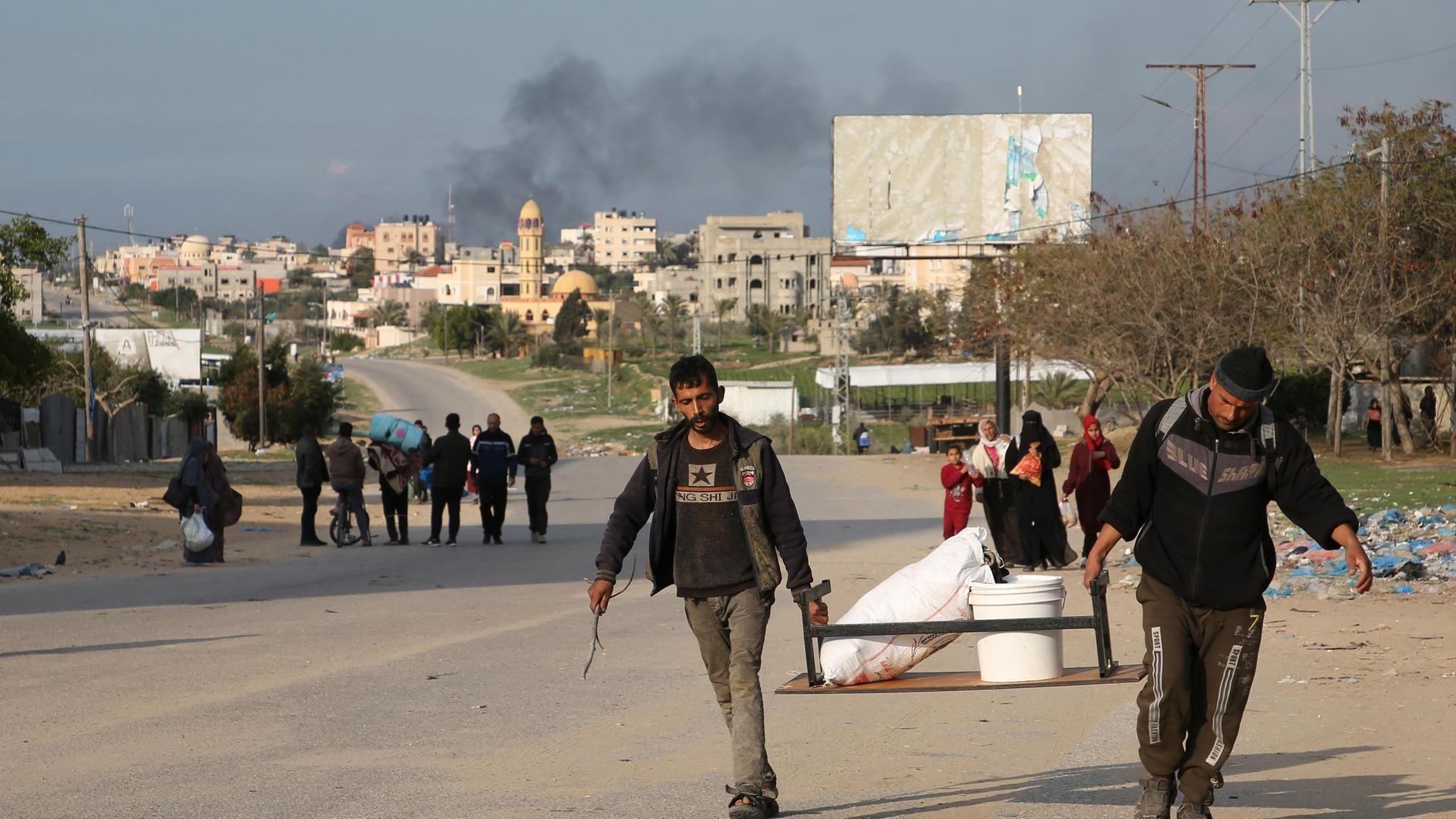Israel strikes southern Gaza, vows 'powerful' Rafah operation
GAZA STRIP

Israel launched a new wave of deadly strikes on southern Gaza Thursday after vowing to push ahead with a "powerful" operation in the overcrowded city of Rafah despite growing international condemnation.
After more than four months of a war that has flattened vast swathes of Gaza, displaced most of the territory's population and pushed people to the brink of starvation, Israeli Prime Minister Benjamin Netanyahu insisted it must press ahead into Rafah for "complete victory".
Hundreds of thousands of people have been driven into Gaza's southernmost city, seeking shelter in a sprawling makeshift encampment near the Egyptian border.
At least 28,576 people, mostly women and children, have been killed in Israel's assault on the Palestinian territory, according to the health ministry in the Hamas-run territory.
"We will fight until complete victory and this includes a powerful action also in Rafah after we allow the civilian population to leave the battle zones," Netanyahu said in a statement on his official Telegram account.
Australia, Canada and New Zealand were the latest to warn Israel not to launch a ground offensive in Rafah, issuing a joint statement saying it would be "devastating" for the 1.5 million Palestinians trapped there.
"There is simply nowhere else for civilians to go," they said.
Ceasefire talks
The Israeli army said troops had carried out "targeted raids" in the southern city of Khan Yunis overnight and killed a "number of terrorists", as well as striking what it said was "underground terrorist infrastructure."
The Hamas-run health ministry said 107 people, "mostly women and children," had been killed in the overnight attacks.
In Cairo, efforts to secure a ceasefire entered a third day, with negotiators from the United States, Qatar and Egypt trying to broker a deal that would suspend the fighting and see the release of the roughly 130 hostages still in Gaza, in exchange for Palestinian prisoners held by Israel.
CIA director William Burns joined the head of Israel's Mossad intelligence service for talks with mediators on Tuesday, while a Hamas delegation was in Cairo Wednesday.
Dozens of the estimated 250 hostages seized by Hamas militants during the Oct. 7 attack were freed in exchange for Palestinian prisoners during a week-long truce in November.
But there was no sign of immediate progress in the latest efforts.
"Israel did not receive in Cairo any new proposal of Hamas on the release of our hostages," Netanyahu's office said in a statement.
Israeli media reported that the country's delegation was told not to return to Cairo and rejoin negotiations until Hamas softens its stance.
While he did not comment directly on the reports, Netanyahu said: "I insist that Hamas drop their delusional demands, and when they drop these demands we can move forward."
Palestinian Authority president Mahmud Abbas, who governs the Israeli-occupied West Bank, called on Hamas to "rapidly" agree to a truce and stave off further tragedy for Palestinians.
Meanwhile a reported peace plan was slammed by two powerful Israeli far-right ministers Thursday, who said they would "in no way agree".
The Washington Post reported that U.S. President Joe Biden's administration and a small group of Arab allies were working out a comprehensive plan for long-term peace which sets a timeline for creating a Palestinian state.
Israel's National Security Minister Itamar Ben Gvir and Finance Minister Bezalel Smotrich, both extreme-right settlers living in the occupied West Bank, both hit out at the plan, saying a Palestinian state "is an existential threat to the State of Israel".
Hospitals 'besieged'
As fighting continued on the ground, the Hamas-run health ministry said one person was killed and several wounded in shelling on Nasser Hospital — one of the largest medical sites in southern Gaza which has been the site of heavy fighting for weeks.
Doctors Without Borders has condemned the Israeli military's order to evacuate thousands of patients, staff and displaced people from the hospital.
The organisation said its staff are continuing to treat patients there "amid near impossible conditions".
"At night, tanks opened heavy fire on the hospital and snipers on the roofs of buildings surrounding Nasser Hospital opened fire and killed three displaced people," he said.
The World Health Organization said it was denied access to the hospital and lost contact with its staff there, while its Palestine representative said most of its mission requests have been denied since January.
Patients were frequently undergoing unnecessary amputations of limbs that could have been saved under ordinary circumstances, he said.
The United Nations says there are no fully functioning hospitals left in Gaza.
'War in the north'
With regional tensions high, the Israeli army said Wednesday that rocket fire from Lebanon killed an Israeli soldier, while Lebanese sources said Israeli strikes had killed 10 people, eight of them civilians.
Since the outbreak of the Israel-Hamas war, Hezbollah has traded near-daily fire with Israeli troops, with tens of thousands displaced on both sides.
But the worst single-day civilian death toll in Lebanon since October raised fears of a broader conflict between Israel and militant group Hezbollah.
After meeting commanders near the Lebanese border, Israeli army chief Herzi Halevi said Israel is "now focused on being ready for war in the north".
















